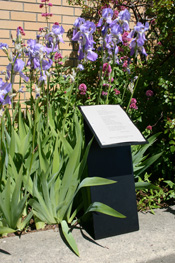Elizabeth Watts Henley, poet
May 20, 2023
survived life filled with personal challenges
This is a guest post by Dean Kahn
Elizabeth Artis (Watts) Henley was born into a prominent Bellingham family in 1912. Her parents, Arthur and Maud Watts, encouraged their four children to pursue higher education, and all of them left their mark.
Sister Ruth was a research chemist. Brother Arthur, Jr., became a general practitioner in Bellingham. Sister Catharine, who went by “Kitty,” took over her father’s real estate and insurance business and became a community, regional, and national civic leader.
Elizabeth, who went by “Betty,” showed literary promise when she won a children’s poetry contest judged by Ella Higginson, Bellingham’s nationally known writer. Elizabeth went on to publish numerous poems in prominent magazines, but her writing and teaching were derailed for several years by the Red Scare after World War II and by time in a mental institution.
The precise reasons she spent more than two years in a mental health facility remain opaque. John Henley, her sole surviving child, says he hasn’t explored public records about his mother’s life, and says any pertinent papers his parents might have possessed have disappeared.
Elizabeth began writing poetry professionally during the early years of the Great Depression. She also was a poetry editor at The Puget Sounder, a weekly newspaper created by June and Farrar Burn, a well-known literary couple who lived for many years in the Northwest, including time in Bellingham.
Elizabeth earned a bachelor’s and a master’s degree at the University of Washington, where she wrote a master’s thesis about 16th century English poet Edmund Spenser, and taught English from 1934 to 1940. While at UW, her friends included left-leaning activists and at least one acknowledged communist.
She also met and married Preston Henley, who attended UW to study business. She and Preston moved to New York City, where Elizabeth taught at Hunter College High School and had more poems published. After the war, the family moved to Boise, Idaho, and then to Portland, Ore.
Elizabeth taught at Portland State College and became friends with many fellow Oregon poets, notably William Stafford and Vi Gale. Her poems appeared in such publications as The New Yorker, Poetry, The Atlantic Monthly, and in McCall’s, Good Housekeeping, and Ladies Home Journal, which were more literary then.
But John Henley says his parents’ marriage became tense, in part because his mother kept her liberal views while his father was “very conservative.” In addition, investigations of alleged communists in academia arose after World War II. A legislative committee investigated the University of Washington. Among those questioned was English professor Sophus Winther, who acknowledged being a communist in the mid-1930s. Elizabeth knew Winther, and mere close association with communists posed risks for one’s job, reputation, even custody of one’s children.
Henley recalls that his mother told him that a top administrator at Portland State College asked her to resign, to protect the college from possible bad publicity. She left the college, then, to avoid bringing ruin on her family, committed herself to a mental health facility.
Elizabeth and Preston divorced in 1956. He gained custody of the children, and later remarried. Meanwhile, Elizabeth’s poet friends lobbied Oregon’s new governor, Mark Hatfield, to gain her release. Hatfield helped Elizabeth obtain a job in 1959 at Oregon State University, in Corvallis, teaching English composition to remedial students.
She disliked being paid less than male professors, and being sexually harassed by colleagues without recourse for help. On the positive side, she continued to write, she loved teaching, and her students loved her. She retired in 1975, and died Jan. 2, 1981, in Corvallis. She’s buried in Bayview Cemetery, in Bellingham.
No book of her poems was published during her lifetime, so, in 2000, her son John and a cousin, Ellen Watts Lodine, published To Hear Unspoken Things, a selection of her work. Here is one of her poems:
“Song of Wheels Turning”
Listen my child to the song I sing,
It is old, it is trite, it is true.
Never go back to the one green hill,
Let it come back to you.
Little and dark, a muffin of trees,
It fades where horizons drop.
You learn as you leave how partial a view
Of the earth you saw from the top.
Taller you travel for being there,
It is less if you return.
Let it come to you as a windy height
Captured from boulder and fern.
There would be tear, only tears, if you found
So much as a gnarled tree,
And cried, “It is here, It is just the same,
The change is in me, in me!”
. . . . .
 Dean Kahn worked for The Bellingham Herald for 29 years, with stints as a reporter, editor, and columnist. He wrote more than 1,000 columns, of which about one-in-seven focused on local history.
Dean Kahn worked for The Bellingham Herald for 29 years, with stints as a reporter, editor, and columnist. He wrote more than 1,000 columns, of which about one-in-seven focused on local history.
This profile is an abridged version of one that appeared in the December 2019 issue of The Journal of the Whatcom County Historical Society. To purchase the issue, or other issues of the journal, go to https://www.whatcomhistory.net, or visit Village Books.
—–
Elizabeth Watts Henley photo courtesy of John Henley


